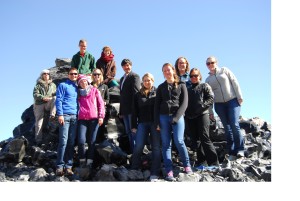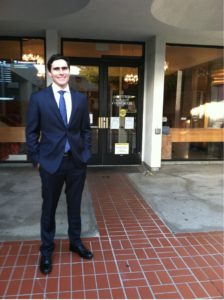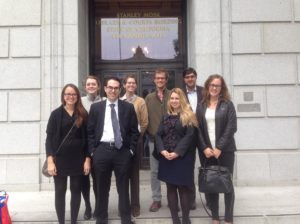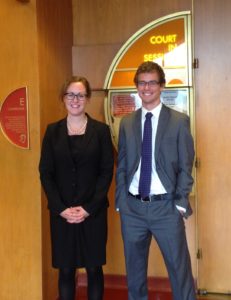Updates from the Environmental Law Clinic
The Environmental Law Clinic had a fantastic fall quarter with seven full-time students and four advanced students. The clinic kicked things off with a three-day field trip to Medicine Lake in northeastern California, the site of one of the clinic’s longest-running cases. In this case, the clinic represents the Pit River Tribe, Tribal coalitions, and environmental organizations in their efforts to protect the Medicine Lake Highlands from geothermal fracking. During the trip students met with the clients, presented at a Pit River Tribal Council meeting, and visited some of the sites that make the Highlands so special. The trip served as the foundation for work by full-time students Philip Womble (JD ‘16/PhD ‘18) and Rose Stanley (JD ’16) on a variety of policy matters, which will contribute to continuing litigation against the decision by the Bureau of Land Management to continue to expose the Highlands to the specter of industrial development. More
-

- Environmental Law clinical team pictured at Medicine Lake
Shortly after visiting Medicine Lake, students, faculty, and staff spent a day in the historic Presidio in San Francisco, a National Landmark, the long-term of which is the subject of a clinic case currently being litigated in the Ninth Circuit. The Presidio Trust, the organization charged with overseeing the public Presidio, has proposed building a large commercial hotel in the Main Post, at the very center of the Presidio. The clinic represents the Presidio Historical Association and the Sierra Club, agencies that believe the Trust’s plans are inconsistent with the Trust’s legal obligations and with the Presidio’s exceptional historic character and value. Full-time students Abigail Barnes (JD ‘16) and Raza Rasheed (JD ‘15) wrote the Ninth Circuit reply brief in the state court case against the regulatory agency, while advanced student Jason George (JD ‘15) presented oral argument at an all-day hearing in Monterey County Superior Court in the case against the water management agency. Jason’s excellent representation spurred actions by the court and state regulators to bring the water management agency one step closer to addressing the problems caused by agricultural pollution.

The impacts of agriculture also formed the basis for work by advanced student Amanda Prasuhn (JD ‘15), who led research into how to limit antibiotics in factory animal farms in California. Amanda also spearheaded research into the corporate governance and tax obligations of non-profit entities involved in the clinic’s ongoing projects.
A mix of full-time and advanced students worked on a new matter, challenging a desalination project in Cambria, on the central California coast. Despite the need for long-term and deliberative planning about how to best manage Cambria’s spare water resources, the project was hastily built without the environmental review required by state law. Full-time clinic students Abigail Barnes, Raza Rasheed, and Liz Jones (JD ‘16), along with advanced student Elizabeth Hook (JD ‘15), worked with clients Landwatch San Luis Obispo County, the Sierra Club, and Greenspace to write and file a petition for a writ of mandate and public record requests, as well as learn the matter’s unusually complicated factual and procedural history. Abigail and Liz also visited the project site and represented the clients at a case management conference in San Luis Obispo Superior Court.
Students appeared at, and worked on, a number of other hearings and matters. Advanced student Evan Stein (JD ‘15) presented oral argument in the California Court of Appeal in Sacramento. The case concerns a challenge to the California Department of Fish & Wildlife’s annual fish-stocking program; every year, the Department stocks lakes throughout the State with non-native fish, with devastating impacts on native fish, amphibians, insects and other species. On behalf of the Center for Biological Diversity, Evan argued before a panel of judges that the Department of Fish & Wildlife needed to conduct more thorough environmental review of the stocking program. We expect a decision in Spring 2015.

Fish were also at the center of a court appearance by full-time students Rose Stanley and Philip Womble, who appeared in Marin County Superior Court to argue on behalf of clinic client Salmon Protection and Watershed Network. In spring 2014, the clinic won a huge victory in the California Court of Appeal (briefed by former clinic students Will Cooper (JD ‘14) and Chris Jones (JD ‘14), and argued by Chris), which held that Marin County’s environmental review for a county general plan failed to adequately account for impacts of streamside development on the imperiled coho salmon. During the fall quarter, Rose and Philip authored opening and reply briefs on the appropriate remedy and argued their cause in the trial court.

Last but not least, the Environmental Law Clinic celebrated two fantastic victories in cases aimed at protecting California’s Mojave Desert. The first case, which has been part of the clinic’s docket since its doors opened in 1997, involved a challenge to a landfill on the flanks of Joshua Tree National Park. clinic students successfully challenged a decision by the Bureau of Land Management to convert public land into private land so the landfill could be built. In December 2014, the parties agreed to a settlement under which the land will once again be public, and perhaps eventually become part of Joshua Tree National Park.
In the second case, the Bureau of Land Management denied an application to build a large-scale solar facility in the Silurian Valley, an unusually intact and beautiful expanse in the heart of the Mojave Desert. Advanced student Elizabeth Hook prepared extensive comments during the decision-making process.
This winter, the clinic continues its work on many of these matters, as well as some new ones, with an unprecedented eight full-time students and ten advanced students. We look forward to another great quarter.
